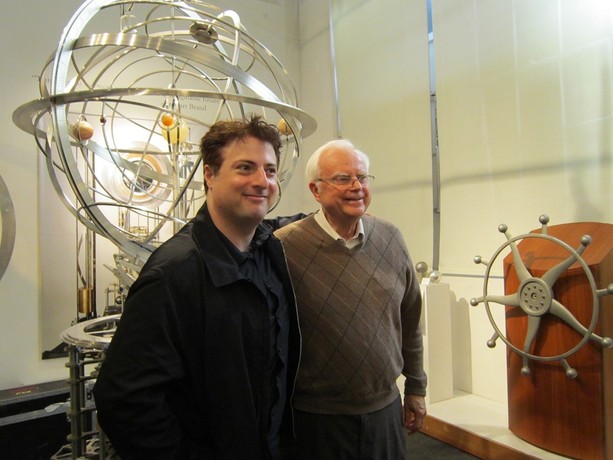Nick Sagan is an American novelist and screenwriter known for blending science fiction, philosophy, and human emotion into compelling storytelling. Best recognized as the son of renowned astronomer Carl Sagan and writer Ann Druyan, Nick has built a distinctive literary and screenwriting career of his own. His creative journey spans television, film, and literature—showcasing a mind shaped by science yet driven by imagination.
Quick Bio
| Full Name | Nicholas Julian Sagan |
|---|---|
| Date of Birth | September 16, 1970 |
| Place of Birth | Ithaca, New York, United States |
| Nationality | American |
| Occupation | Novelist, Screenwriter, Lecturer |
| Genres | Science Fiction, Drama, Adventure |
| Famous Works | Idlewild Trilogy, Star Trek: Voyager, Star Trek: The Next Generation |
| Parents | Carl Sagan (Father), Ann Druyan (Mother) |
| Education | University of California, Los Angeles (UCLA) |
| Years Active | 1990s – Present |
| Known For | Combining science and storytelling with philosophical insight |
Early Life and Family Background

Nick Sagan was born on September 16, 1970, in Ithaca, New York, a place closely associated with his father’s academic career at Cornell University. Growing up as the son of Carl Sagan, the world-famous astronomer, and Ann Druyan, an award-winning author and producer, Nick was surrounded by creativity, intellect, and a deep appreciation for the mysteries of the universe.
From an early age, he was encouraged to explore both art and science, developing a fascination with how storytelling could illuminate the human condition. Interestingly, at the age of six, Nick Sagan’s voice was included on NASA’s Voyager Golden Record, a time capsule sent into space to represent life on Earth. His recorded words, “Hello from the children of planet Earth,” have now traveled farther into the cosmos than any human ever has—a poetic foreshadowing of his lifelong link between imagination and science.
Education and Academic Background
Nick Sagan’s educational journey played a major role in shaping his artistic sensibilities. He attended the University of California, Los Angeles (UCLA), where he majored in English Literature and began exploring screenwriting. His studies allowed him to merge academic analysis of classic literature with the techniques of modern storytelling.
While many might assume his father’s scientific fame dictated his career path, Nick chose to follow a creative trajectory. His education at UCLA helped him refine his narrative voice, understand character psychology, and develop the discipline necessary for professional writing. During his time there, he began writing scripts that would later open doors to the entertainment industry.
Career Beginnings in Screenwriting
Before becoming a novelist, Nick Sagan made his mark as a screenwriter. His career began in the 1990s when he started writing for television and animation studios in Hollywood. His early works displayed a mix of science fiction and emotional storytelling—traits that soon earned him recognition.
Nick’s first significant writing opportunities came from television, where he contributed to animated series and later moved toward larger projects in science fiction. His ability to create believable worlds and complex characters quickly distinguished him as a talented storyteller.
Major Screenwriting Projects
One of Nick Sagan’s most notable achievements as a screenwriter is his work on the legendary Star Trek franchise. He wrote episodes for both Star Trek: The Next Generation and Star Trek: Voyager, two of the most iconic series in the science fiction genre. His episodes were praised for their philosophical depth and character-driven plots—echoing the intellectual curiosity inherited from his father.
Aside from Star Trek, Nick also contributed to science fiction television and film projects that explored futuristic societies, moral dilemmas, and humanity’s place in the universe. His scripts combined imaginative storytelling with authentic emotion, proving that he could craft stories appealing to both hardcore sci-fi fans and general audiences.
Transition to Novelist and Literary Career
After establishing himself in television, Nick Sagan transitioned into the world of fiction writing. His debut novel, Idlewild (2003), received critical acclaim for its originality and thought-provoking themes. The book introduced readers to a near-future world where young minds awaken in a virtual environment after a mysterious plague.
Following the success of Idlewild, he released Edenborn (2004) and Everfree (2006), completing what became known as the Idlewild Trilogy. These novels blend philosophical reflection, technology, and post-apocalyptic storytelling, demonstrating Sagan’s mastery of speculative fiction.
Critics praised his ability to balance intellectual ideas with emotional resonance, calling his work “a brilliant combination of science and soul.” The trilogy has since earned a loyal readership among science fiction enthusiasts.
Writing Style and Themes
Nick Sagan’s writing style is both cerebral and deeply human. His narratives often explore questions about identity, consciousness, and morality—themes influenced by his upbringing in a household filled with discussions about science and existence.
He is known for using precise language, vivid imagery, and layered storytelling to immerse readers in complex worlds. Whether writing for television or novels, Sagan consistently focuses on the emotional core of his characters. His works often question how humanity adapts to technology and what it means to be truly alive in a digital or post-human age.
This balance between intellect and empathy makes his voice stand out in the world of speculative fiction.
Influence of Carl Sagan on His Life and Work
Being the son of Carl Sagan naturally had a profound impact on Nick Sagan’s worldview. Carl Sagan was not only one of the most celebrated astronomers but also a poet of science—a man who could make the cosmos feel personal.
Nick inherited this same ability to connect the intellectual with the emotional. However, he also worked hard to establish his own identity apart from his father’s immense legacy. In interviews, Nick has expressed admiration for his parents’ contributions to humanity but emphasizes his desire to tell his own stories.
The father-son bond extended beyond inspiration; it also reflected mutual respect. Carl encouraged Nick’s creative pursuits, recognizing storytelling as another way to explore the universe. Today, Nick continues to honor that influence while crafting his unique artistic path.
Personal Life and Relationships

Nick Sagan maintains a relatively private personal life compared to his famous parents. Although not much is publicly known about his romantic relationships or family life, he has spoken about the importance of balancing creativity with personal fulfillment.
He has occasionally shared reflections about his parents, childhood memories, and how love and curiosity were central to his upbringing. While he prefers to keep his relationships out of the spotlight, it’s clear that family, friendship, and meaningful connection remain at the heart of his worldview.
Age and Physical Appearance
As of 2025, Nick Sagan is 55 years old. He has a calm and thoughtful presence, often described by those who know him as reflective and approachable. Physically, he carries himself with quiet confidence—fitting for a writer who blends intellect and emotion so seamlessly.
His expressive eyes and composed demeanor reveal the introspective nature of a man who spends his life exploring human consciousness and the future of civilization through words.
Achievements and Recognition
Over his career, Nick Sagan has achieved success across multiple creative fields. As a screenwriter, he contributed to some of television’s most influential science fiction series. As a novelist, his Idlewild trilogy earned international recognition for its innovation and depth.
In addition, Nick has written essays and given lectures about storytelling, science, and creativity—continuing his family’s legacy of public intellectual engagement. His work is admired for challenging readers to think critically while keeping them emotionally invested.
Current Work and Future Projects
Currently, Nick Sagan remains active as a writer, educator, and public speaker. He continues to develop new creative projects, both in literature and media, that explore the intersection of science and human experience.
He has also participated in collaborations and interviews discussing topics like artificial intelligence, storytelling in digital spaces, and the future of human communication. His unique ability to merge scientific thought with creative expression ensures his continued relevance in modern literature.
Fans eagerly await news of his next novel or television project, as his storytelling consistently reflects timeless curiosity about humanity’s place in the universe.
Legacy and Influence
Nick Sagan’s influence extends far beyond his individual works. As both an American novelist and screenwriter, he represents the fusion of art, science, and imagination. His ability to bring philosophical depth to popular storytelling has inspired a new generation of writers who seek meaning in speculative fiction.
While his father, Carl Sagan, inspired humanity to look to the stars, Nick invites readers to look inward—to explore the digital, emotional, and moral frontiers of the human soul. His contributions continue to enrich science fiction and ensure that the Sagan legacy remains one of wonder, discovery, and empathy.
Conclusion
Nick Sagan stands as a creative force who has carved his own identity while carrying forward a legacy rooted in curiosity and imagination. From Star Trek scripts to the Idlewild novels, his work bridges science and art in a way few writers can.
His journey shows that storytelling—whether through words on a page or voices in the stars—has the power to connect humanity across time and space. In his thoughtful prose and visionary worlds, Nick Sagan reminds us that imagination is our greatest tool for understanding who we are and where we might go next.
FAQs
Who is Nick Sagan?
Nick Sagan is an American novelist and screenwriter, best known as the son of astronomer Carl Sagan and writer Ann Druyan.
What is Nick Sagan known for?
He is known for his Idlewild trilogy and for writing episodes of Star Trek: The Next Generation and Star Trek: Voyager.
When was Nick Sagan born?
Nick Sagan was born on September 16, 1970, in Ithaca, New York, United States.
What are Nick Sagan’s most famous books?
His most popular novels are Idlewild (2003), Edenborn (2004), and Everfree (2006), collectively known as the Idlewild trilogy.
What inspired Nick Sagan’s writing career?
Growing up with parents passionate about science and storytelling inspired him to combine philosophy, science, and fiction in his own work.
What TV shows has Nick Sagan written for?
He has written for Star Trek: The Next Generation, Star Trek: Voyager, and several other science fiction and animation projects.
Did Nick Sagan’s voice go into space?
Yes, as a child, Nick Sagan’s voice was recorded on NASA’s Voyager Golden Record, which was launched into space in 1977.
What is Nick Sagan’s connection to Carl Sagan?
He is the son of Carl Sagan, the world-famous astronomer, author, and science communicator.
Is Nick Sagan married or has children?
Nick Sagan keeps his personal life private, and limited information is publicly available about his relationships or family.
What is Nick Sagan doing now?
He continues to work as a writer, educator, and speaker, exploring new creative projects in literature and science fiction.
For more Visit VintagePosts















Leave a Reply